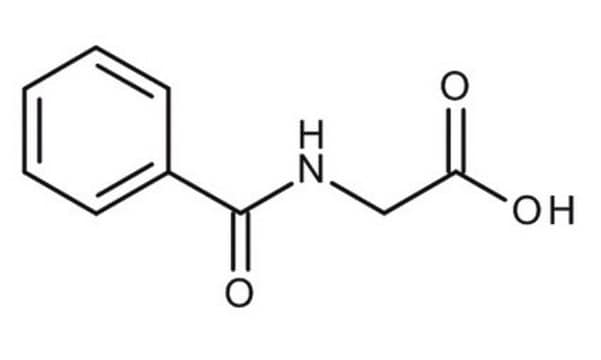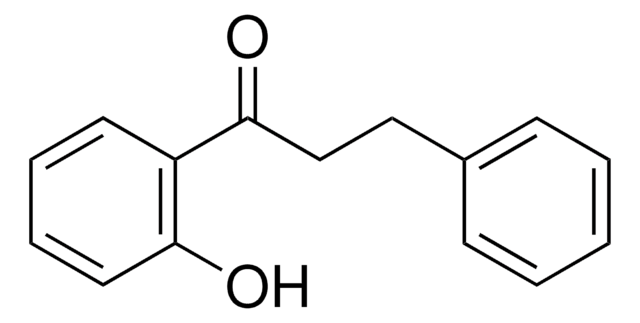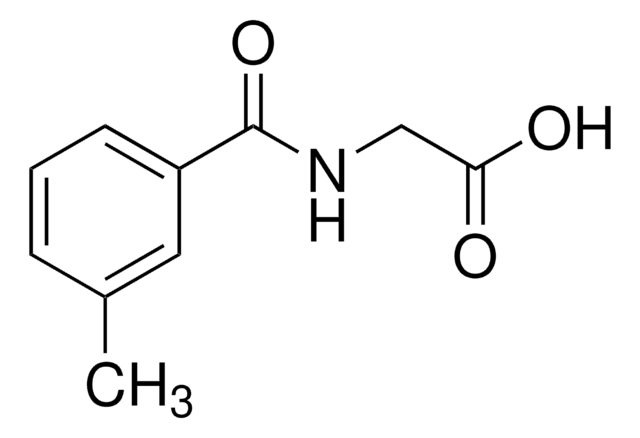112003
Hippuric acid
98%
Synonym(s):
N-Benzoylglycine, Benzoylaminoacetic acid
Sign Into View Organizational & Contract Pricing
All Photos(1)
About This Item
Linear Formula:
C6H5CONHCH2COOH
CAS Number:
Molecular Weight:
179.17
Beilstein:
1073987
EC Number:
MDL number:
UNSPSC Code:
12352209
PubChem Substance ID:
NACRES:
NA.25
Recommended Products
Product Name
Hippuric acid, 98%
Assay
98%
form
powder, crystals or chunks
mp
187-191 °C (lit.)
application(s)
peptide synthesis
SMILES string
OC(=O)CNC(=O)c1ccccc1
InChI
1S/C9H9NO3/c11-8(12)6-10-9(13)7-4-2-1-3-5-7/h1-5H,6H2,(H,10,13)(H,11,12)
InChI key
QIAFMBKCNZACKA-UHFFFAOYSA-N
Gene Information
rat ... Akr1b1(24192)
Looking for similar products? Visit Product Comparison Guide
Related Categories
Application
Hippuric acid can be used to study cell biology, chemical biology, bioactive small molecules, amino acid derivatives, peptide synthesis, chemical synthesis and nutrition. Hippuric acid has been used to inform the metabolism and urinary excretion of procyanidins.
Storage Class Code
11 - Combustible Solids
WGK
WGK 3
Flash Point(F)
Not applicable
Flash Point(C)
Not applicable
Personal Protective Equipment
dust mask type N95 (US), Eyeshields, Gloves
Choose from one of the most recent versions:
Already Own This Product?
Find documentation for the products that you have recently purchased in the Document Library.
Customers Also Viewed
H Ukai et al.
Occupational and environmental medicine, 51(8), 523-529 (1994-08-01)
Exposure monitoring by personal diffusive samplers, biological monitoring of toluene exposure by urinary hippuric acid determination, haematology, serum biochemistry for liver function, and a subjective symptom survey by questionnaire were conducted on 303 male solvent workers. They were exposed to
Yoshiharu Itoh et al.
Analytical and bioanalytical chemistry, 403(7), 1841-1850 (2012-03-27)
Cardiovascular disease (CVD) is prevalent in patients with chronic kidney disease (CKD). In hemodialysis (HD) patients, some protein-bound uremic toxins are considered to be associated with CVD. However, it is not yet known which uremic toxins are important in terms
Justin J J van der Hooft et al.
Analytical chemistry, 84(16), 7263-7271 (2012-07-26)
In dietary polyphenol exposure studies, annotation and identification of urinary metabolites present at low (micromolar) concentrations are major obstacles. To determine the biological activity of specific components, it is necessary to have the correct structures and the quantification of the
T Takada et al.
Scientific reports, 8(1), 11147-11147 (2018-07-26)
Chronic kidney disease (CKD) patients accumulate uremic toxins in the body, potentially require dialysis, and can eventually develop cardiovascular disease. CKD incidence has increased worldwide, and preventing CKD progression is one of the most important goals in clinical treatment. In
Kristin J Adolfsen et al.
Nature communications, 12(1), 6215-6215 (2021-10-30)
In phenylketonuria (PKU) patients, a genetic defect in the enzyme phenylalanine hydroxylase (PAH) leads to elevated systemic phenylalanine (Phe), which can result in severe neurological impairment. As a treatment for PKU, Escherichia coli Nissle (EcN) strain SYNB1618 was developed under
Our team of scientists has experience in all areas of research including Life Science, Material Science, Chemical Synthesis, Chromatography, Analytical and many others.
Contact Technical Service











